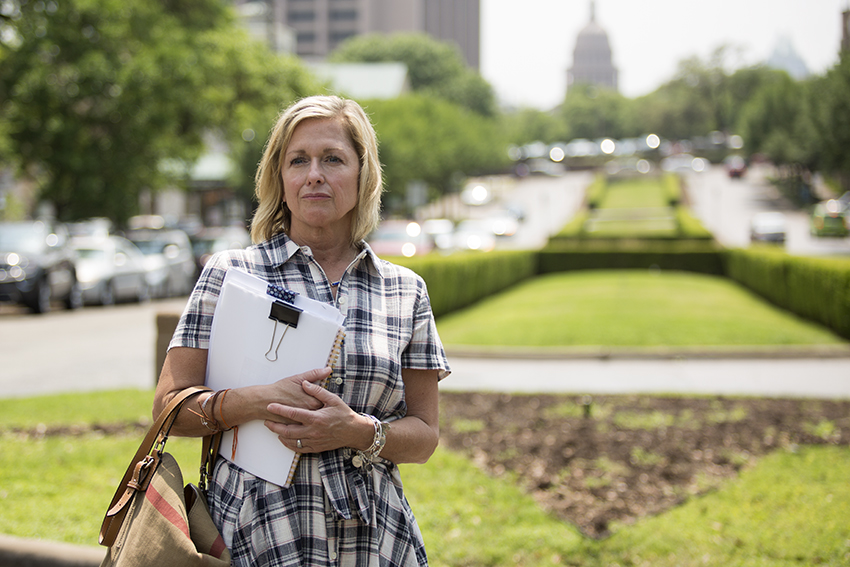Walking on campus in April, Lori Brown remembered her son Harrison Brown’s first year at UT.
“Harrison had a moped down here,” Lori said with a laugh in the AT&T Center parking lot. “He had a fun time with that down here, but he did have a couple of parking tickets.”
Lori once saw the 40 Acres as a source of pride. Since Harrison’s death, she only returns for meetings with the University or state officials.
“Every time I come back to the campus it’s very hard, and with each time it’s even worse because the anniversary is so close,” Lori said.
Lori still doesn’t understand how her son could have died at UT, but she has made it her mission to make the campus safer.
“I never dreamed that he would be attacked and his life would be taken on the college campus, in broad daylight,” Lori said.
Lori had just finished talking to Harrison on May 1, 2017, when minutes later she received a second call from his phone. This time the caller was a stranger telling her Harrison had been stabbed.
Amid the chaos of the news, Lori raced to the airport where a friend flew her to Austin.
“I still was hoping I was going to go see him,” Lori said.
But she was met at the hospital by her sister-in-law, who told her Harrison had already died.
Lori faced the news without her husband, who was battling a neurodegenerative disease and unable to travel. And her older son was taking a law school final in San Antonio.
“It was very tough, very traumatic,” Lori said.
Advocating for campus safety
Lori had always planned to advocate for Harrison, but she spent the last year coping with the deaths of Harrison and her husband, who died last June from complications related to his disease.
But then Lori heard about the Parkland shooting.
“I didn’t watch any of that footage,” Lori said. “I turned it off because I know all too well what that phone call is like.”
Days later, she was inspired by students on TV calling for increased campus safety.
“I stopped for a second and I thought, ‘Oh my gosh, I need to be doing something for Harrison right now,’” Lori said. “I’ve just moved forward ever since.”
The day Harrison was killed, the state legislature was set to discuss House Bill 1935, which allows people to openly carry knives almost anywhere in Texas. As news of the stabbing spread, the legislature tabled the bill. It was still passed the following week.
“Knowing that somebody had just died by a knife does make one pause and re-evaluate (the bill) and make sure nothing you’re doing will promote that type of thing,” said State Rep. Drew Springer, R-Muenster, one of the bill’s authors. “We came back with the understanding it wouldn’t.”
In response to the stabbing, the legislature added an amendment banning the open-carry of knives on college campuses. But Lori said she would like to see the bill weakened or repealed.
“I was so sad and disappointed when I heard (of the bill’s passing) because I thought it didn’t matter to them that my son was just murdered on a college campus by one of these knives,” Lori said.
Lori said Springer told her he disagrees with repealing HB 1935, but she plans to speak with more state officials to see what can be done in the coming 2019 legislative session.
In the meantime, Lori has met with University officials. She said she appreciates the safety improvements that have been implemented but wants to see more UT Police Department officers patrolling and more metal detectors throughout campus.
“I really do believe if there had been a metal detector that day, possibly my son’s life would have been spared … because that knife would have been confiscated,” Lori said.
The University uses metal detectors in “high-traffic” or “high-risk” areas such as the Frank Erwin Center and observation deck of the Tower. Jimmy Johnson, assistant vice president for campus safety, said adding more detectors around campus would require a huge investment and changes to building entrances, so they have focused on “strategic” placement of surveillance equipment.
“Being strategic allows us to harden security for high-risk areas while maintaining the open and welcoming environment public university strive to achieve,” Johnson said in a statement.
Lori knows changing Texas law or the UT campus will not be easy, but she’s determined to do something.
“I’m not going to take no for an answer, and I have nothing to lose,” Lori said.
Lori will not be on campus today for Harrison’s memorial, but she said she plans to attend UT Remembers this Friday.
“There’s really no preparing (for the anniversary),” Lori said. “I’m just going to have to deal with it the best way that I can. But it just won’t be this year, it’ll be every year for the rest of my life on May 1.”





















